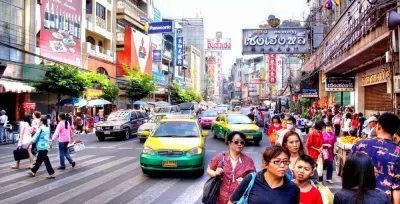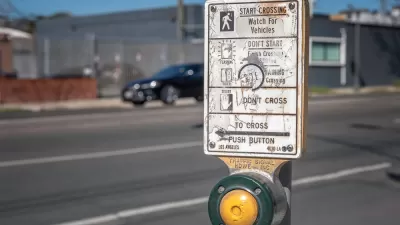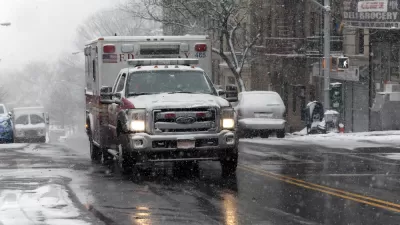In his second global transportation donation meant to reduce death and injury from transportation, the former NYC mayor will take a decidedly urban focus by directing his foundation to select ten cities to receive $125 million, he announced Monday.

"Mr. Bloomberg is expected to announce Monday that his philanthropic organization will spend $125 million during the next five years on programs to reduce traffic deaths and injuries in 10 cities in low- and middle-income countries," writes Betsy McKay who reports on global and public health issues for The Wall Street Journal.
Bloomberg Philanthropies said it would invite 20 cities with populations of more than two million to apply for grants; 10 will be chosen by next January, said Kelly Henning, who heads the philanthropy's public-health programs.
Some stats: "The World Health Organization estimates that traffic incidents will be linked to 1.4 million deaths in 2015," writes McKay. Last year we noted that WHO reported the figure was 1.2 million.
More than 90% of traffic fatalities occur in low- and middle-income countries, where traffic laws haven't kept up with the growing number of vehicles clogging roads, the agency said. As many as 50 million people a year globally suffer road-related injuries.
According to the Bloomberg Philanthropies press release, "unless urgent action is taken, [traffic fatalities] will become the seventh leading cause of death by 2030."
Bloomberg's first global transportation donation, also $125 million, intended to reduce road fatalities and injuries went to "10 countries that represent half of the globe's annual traffic deaths," writes McKay. Results included drunk driving and seat belt laws.
However, what was learned was that the laws' "success will depend in part on how well it is implemented in the country's urban areas," stated Piyush Tewari, "founder and chief executive of SaveLIFE Foundation, a nongovernmental organization in India that used a grant from Bloomberg Philanthropies to push for a new national road-safety law," notes McKay.
Should Bloomberg do a third round, he might consider opening the competition to U.S. cities as it turns out our track record isn't that good, as noted by a study last year from the Organization of Economic Cooperation and Development posted here.
FULL STORY: Bloomberg Funds Road Safety in World Cities

Maui's Vacation Rental Debate Turns Ugly
Verbal attacks, misinformation campaigns and fistfights plague a high-stakes debate to convert thousands of vacation rentals into long-term housing.

Planetizen Federal Action Tracker
A weekly monitor of how Trump’s orders and actions are impacting planners and planning in America.

San Francisco Suspends Traffic Calming Amidst Record Deaths
Citing “a challenging fiscal landscape,” the city will cease the program on the heels of 42 traffic deaths, including 24 pedestrians.

Defunct Pittsburgh Power Plant to Become Residential Tower
A decommissioned steam heat plant will be redeveloped into almost 100 affordable housing units.

Trump Prompts Restructuring of Transportation Research Board in “Unprecedented Overreach”
The TRB has eliminated more than half of its committees including those focused on climate, equity, and cities.

Amtrak Rolls Out New Orleans to Alabama “Mardi Gras” Train
The new service will operate morning and evening departures between Mobile and New Orleans.
Urban Design for Planners 1: Software Tools
This six-course series explores essential urban design concepts using open source software and equips planners with the tools they need to participate fully in the urban design process.
Planning for Universal Design
Learn the tools for implementing Universal Design in planning regulations.
Heyer Gruel & Associates PA
JM Goldson LLC
Custer County Colorado
City of Camden Redevelopment Agency
City of Astoria
Transportation Research & Education Center (TREC) at Portland State University
Jefferson Parish Government
Camden Redevelopment Agency
City of Claremont




























